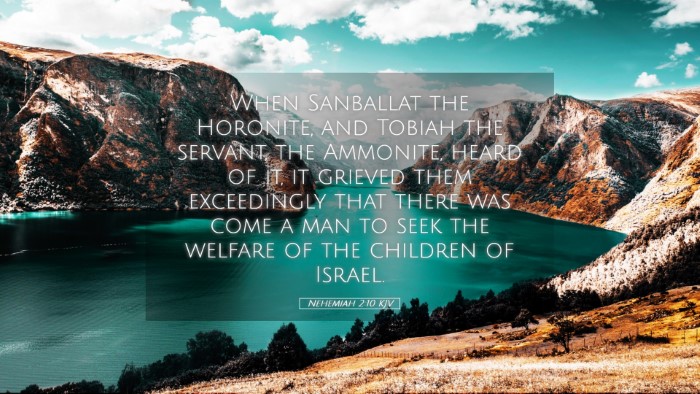Old Testament
Genesis Exodus Leviticus Numbers Deuteronomy Joshua Judges Ruth 1 Samuel 2 Samuel 1 Kings 2 Kings 1 Chronicles 2 Chronicles Ezra Nehemiah Esther Job Psalms Proverbs Ecclesiastes Song of Solomon Isaiah Jeremiah Lamentations Ezekiel Daniel Hosea Joel Amos Obadiah Jonah Micah Nahum Habakkuk Zephaniah Haggai Zechariah MalachiNehemiah 2:10
Nehemiah 2:10 KJV
When Sanballat the Horonite, and Tobiah the servant, the Ammonite, heard of it, it grieved them exceedingly that there was come a man to seek the welfare of the children of Israel.
Nehemiah 2:10 Bible Commentary
Commentary on Nehemiah 2:10
Verse: "When Sanballat the Horonite and Tobiah the Ammonite official heard about this, they were very much disturbed that someone had come to promote the welfare of the Israelites." (Nehemiah 2:10, NIV)
Contextual Analysis
This verse emerges in a critical juncture of Nehemiah's journey back to Jerusalem to oversee the rebuilding of the walls. His mission was met with immediate opposition from Sanballat and Tobiah, illustrating the persistent challenges faced by God's people in pursuing divine assignments.
Insights from Matthew Henry
Matthew Henry emphasizes the nature of opposition inherent in Nehemiah's undertaking. He notes that the reaction of Sanballat and Tobiah reveals their deep-rooted animosity towards the restoration of Jerusalem and its people. Henry posits that such opposition stemmed from a desire to maintain their own power and influence among the surrounding nations.
- Spiritual Warfare: Henry aligns this opposition with the theme of spiritual warfare, suggesting that their discontent is emblematic of the broader struggle between the forces of good and evil.
- Concern for Jerusalem: He identifies Nehemiah's project as not just a physical endeavor but a spiritual revival for Israel. This realization may have aggravated those who thrived under the peril of Israel’s desolation.
Insights from Albert Barnes
Albert Barnes contributes a historical dimension to the commentary by explaining the geopolitical implications of this reaction. He notes that Sanballat and Tobiah were influential figures in the surrounding regions, perceiving Nehemiah's endeavors as a direct threat to their authority.
- Political Motivations: Barnes highlights these leaders' political motivations, suggesting that their anger signifies a fear of losing control over the local populace.
- Implications of Leadership: Barnes also stresses the essential nature of leadership in spiritual endeavors; the presence of determined opponents serves as a sober reminder of the challenges that accompany any significant work for God.
Insights from Adam Clarke
Adam Clarke examines the emotional and psychological dimensions of the verse. Clarke notes the starkness of the phrase "very much disturbed", indicating a profound anxiety that transcends mere inconvenience. This, he argues, reveals a deeper sociopolitical unrest stirred by the initiative for rebuilding.
- Nature of Opposition: Clarke discusses how this opposition was multifaceted—encompassing jealousy, fear of loss, and a reaction against change.
- Faith and Resolution: He encourages readers to see Nehemiah’s steadfastness despite opposition as a paradigm of faithfulness and fortitude in the face of adversity.
Theological Implications
This verse encapsulates key theological themes pertinent to the nature of God's work in the world. It invites reflection upon the inevitability of conflict when pursuing God-given missions:
- Divine Purpose: The establishment and fortification of Jerusalem signify God's covenantal faithfulness. Nehemiah's role reflects the ongoing narrative of restoration and hope.
- Call to Action: The response of Sanballat and Tobiah serves as a cautionary tale for modern believers; that taking a stand for God's work may invite similar disturbances.
Pastoral Applications
For pastors and church leaders, Nehemiah 2:10 underscores several practical lessons:
- Expect Opposition: Leaders should prepare congregants to face potential pushback, encouraging resilience and unity in the face of challenges.
- Maintain Focus: It is vital to emphasize diligence in the mission God has called the church to, reminding congregants that opposition is often a sign of the significance of their efforts.
- Cultivating Community: The necessity of fostering a supportive community, much like the Jewish people rallied around Nehemiah, enables collective strength against adversity.
Conclusion
Nehemiah 2:10 leads us into a profound understanding of the challenges faced by those who are called to build and to restore. The reactions of Sanballat and Tobiah serve as a reminder that any meaningful work in the Kingdom will encounter opposition, demanding both perseverance and faith. As we reflect on the insights from foundational commentaries, let us embrace the calling, equipped to withstand the disturbances of our day.


